常见不及物动词搭配(2018年9月27日10页)
常见不及物动词搭配2016
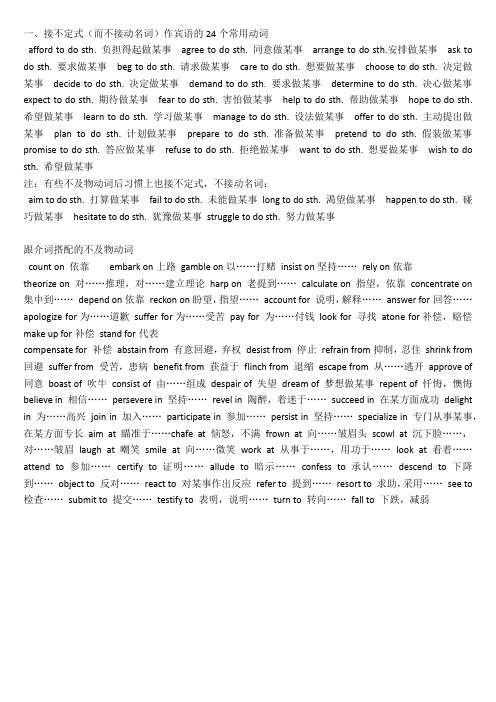
一、接不定式(而不接动名词)作宾语的24个常用动词afford to do sth. 负担得起做某事agree to do sth. 同意做某事arrange to do sth.安排做某事ask to do sth. 要求做某事beg to do sth. 请求做某事care to do sth. 想要做某事choose to do sth. 决定做某事decide to do sth. 决定做某事demand to do sth. 要求做某事determine to do sth. 决心做某事expect to do sth. 期待做某事fear to do sth. 害怕做某事help to do sth. 帮助做某事hope to do sth. 希望做某事learn to do sth. 学习做某事manage to do sth. 设法做某事offer to do sth. 主动提出做某事plan to do sth. 计划做某事prepare to do sth. 准备做某事pretend to do sth. 假装做某事promise to do sth. 答应做某事refuse to do sth. 拒绝做某事want to do sth. 想要做某事wish to do sth. 希望做某事注:有些不及物动词后习惯上也接不定式,不接动名词:aim to do sth. 打算做某事fail to do sth. 未能做某事long to do sth. 渴望做某事happen to do sth. 碰巧做某事hesitate to do sth. 犹豫做某事struggle to do sth. 努力做某事跟介词搭配的不及物动词count on 依靠embark on上路gamble on以……打赌insist on坚持……rely on依靠theorize on 对……推理,对……建立理论harp on 老提到……calculate on 指望,依靠concentrate on 集中到……depend on依靠reckon on盼望,指望……account for 说明,解释……answer for回答……apologize for为……道歉suffer for为……受苦pay for 为……付钱look for 寻找atone for补偿,赔偿make up for补偿stand for代表compensate for 补偿abstain from 有意回避,弃权desist from 停止refrain from抑制,忍住shrink from 回避suffer from 受苦,患病benefit from 获益于flinch from 退缩escape from 从……逃开approve of 同意boast of 吹牛consist of 由……组成despair of 失望dream of 梦想做某事repent of 忏悔,懊悔believe in 相信……persevere in 坚持……revel in 陶醉,着迷于……succeed in 在某方面成功delight in 为……高兴join in 加入……participate in 参加……persist in 坚持……specialize in 专门从事某事,在某方面专长aim at 瞄准于……chafe at 恼怒,不满frown at 向……皱眉头scowl at 沉下脸……,对……皱眉laugh at 嘲笑smile at向……微笑work at 从事于……,用功于……look at 看着……attend to 参加……certify to 证明……allude to 暗示……confess to 承认……descend to 下降到……object to 反对……react to 对某事作出反应refer to 提到……resort to 求助,采用……see to 检查……submit to 提交……testify to 表明,说明……turn to 转向……fall to 下跌,减弱在英语错误中,“及物动词+介词+宾语”(transitive verb+preposition+object),是常见的一种。
常见不及物动词归纳
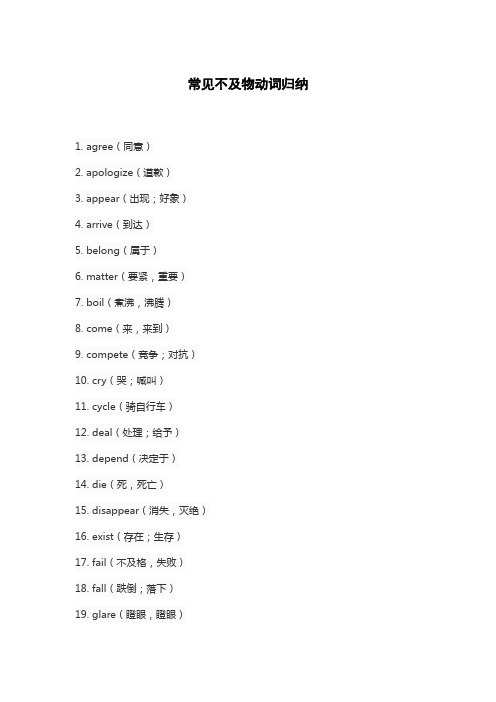
常见不及物动词归纳1. agree(同意)2. apologize(道歉)3. appear(出现;好象)4. arrive(到达)5. belong(属于)6. matter(要紧,重要)7. boil(煮沸,沸腾)8. come(来,来到)9. compete(竞争;对抗)10. cry(哭;喊叫)11. cycle(骑自行车)12. deal(处理;给予)13. depend(决定于)14. die(死,死亡)15. disappear(消失,灭绝)16. exist(存在;生存)17. fail(不及格,失败)18. fall(跌倒;落下)19. glare(瞪眼,瞪眼)20. go(去,走)21. graduate(毕业)22. happen(发生,出现)23. hesitate(踌躇,犹豫)24. hurry(匆忙)25. laugh(笑,大笑)26. lie(躺,平躺)27. listen(注意地听)28. live(居住,生活)29. look(看)30. move(搬家;移动)31. object(反对)32. occur(发生)33. rain(下雨)34. rest(休息;其余的)35. rise(上升,起床)36. run(跑)37. sail(航行,起航)38. settle(定居)39. sit(坐)40. skate(溜冰,滑冰)41. sleep(睡觉)42. smile(微笑)43. snow(下雪)44. stand(站立,位于)45. stare(凝视,盯着看)46. stay(呆,停留)47. succeed(成功)48. swim(游泳)49. talk(谈话)50. travel(旅行)51. wait(等,等待)52. walk(步行,散步)。
不及物的用法
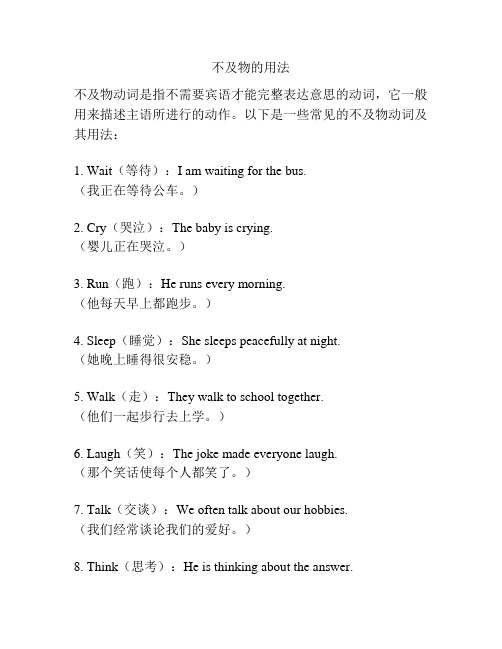
不及物的用法
不及物动词是指不需要宾语才能完整表达意思的动词,它一般用来描述主语所进行的动作。
以下是一些常见的不及物动词及其用法:
1. Wait(等待):I am waiting for the bus.
(我正在等待公车。
)
2. Cry(哭泣):The baby is crying.
(婴儿正在哭泣。
)
3. Run(跑):He runs every morning.
(他每天早上都跑步。
)
4. Sleep(睡觉):She sleeps peacefully at night.
(她晚上睡得很安稳。
)
5. Walk(走):They walk to school together.
(他们一起步行去上学。
)
6. Laugh(笑):The joke made everyone laugh.
(那个笑话使每个人都笑了。
)
7. Talk(交谈):We often talk about our hobbies.
(我们经常谈论我们的爱好。
)
8. Think(思考):He is thinking about the answer.
(他正在考虑答案。
)
9. Sing(唱歌):She sings beautifully.
(她唱得很美。
)
10. Dance(跳舞):They dance gracefully on the stage. (他们在舞台上跳舞优美。
)。
10个不及物动词例子大全
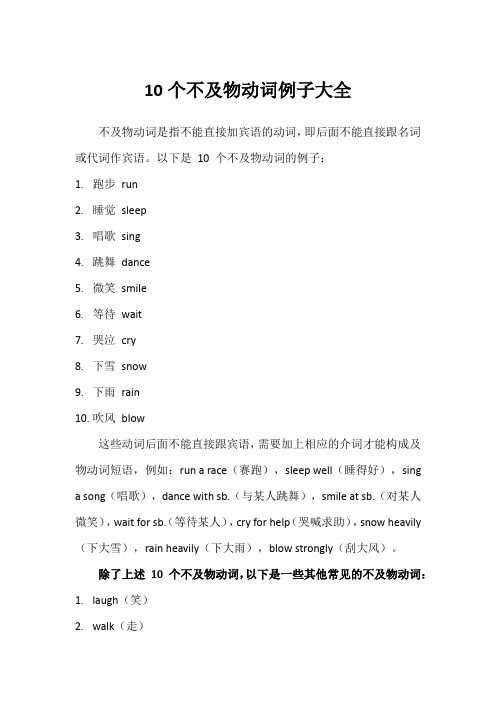
10个不及物动词例子大全
不及物动词是指不能直接加宾语的动词,即后面不能直接跟名词或代词作宾语。
以下是10 个不及物动词的例子:
1.跑步run
2.睡觉sleep
3.唱歌sing
4.跳舞dance
5.微笑smile
6.等待wait
7.哭泣cry
8.下雪snow
9.下雨rain
10.吹风blow
这些动词后面不能直接跟宾语,需要加上相应的介词才能构成及物动词短语,例如:run a race(赛跑),sleep well(睡得好),sing a song(唱歌),dance with sb.(与某人跳舞),smile at sb.(对某人微笑),wait for sb.(等待某人),cry for help(哭喊求助),snow heavily (下大雪),rain heavily(下大雨),blow strongly(刮大风)。
除了上述10 个不及物动词,以下是一些其他常见的不及物动词:
ugh(笑)
2.walk(走)
3.swim(游泳)
4.talk(说话)
5.think(思考)
6.hope(希望)
7.dream(梦想)
8.work(工作)
9.study(学习)
10.live(生活)
这些动词都不能直接跟宾语,需要加上适当的介词或副词才能构成及物动词短语。
例如,talk to/with sb.(与某人交谈),think about sth.(思考某事),hope for sth.(希望某事),dream of sth.(梦想某事),work on sth.(从事某事),study for sth.(为某事学习),live in sp.(住在某地)。
汉语常见的40个不及物动词
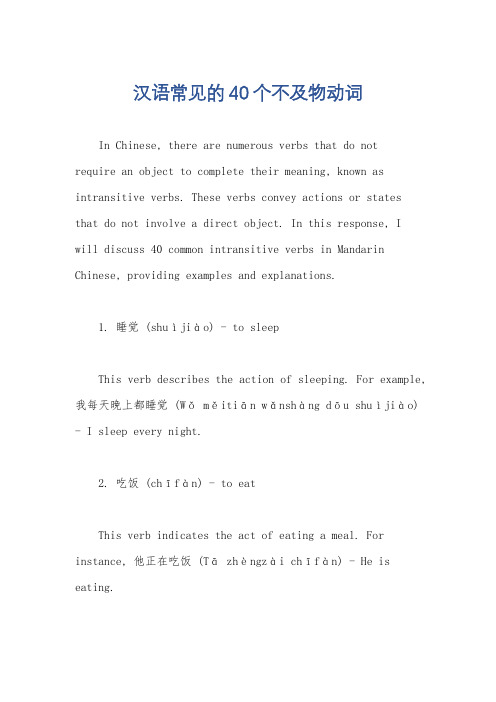
汉语常见的40个不及物动词In Chinese, there are numerous verbs that do notrequire an object to complete their meaning, known as intransitive verbs. These verbs convey actions or statesthat do not involve a direct object. In this response, Iwill discuss 40 common intransitive verbs in Mandarin Chinese, providing examples and explanations.1. 睡觉(shuìjiào) - to sleepThis verb describes the action of sleeping. For example, 我每天晚上都睡觉(Wǒ měitiān wǎnshàng dōu shuìjiào) - I sleep every night.2. 吃饭(chīfàn) - to eatThis verb indicates the act of eating a meal. For instance, 他正在吃饭(Tā zhèngzài chīfàn) - He is eating.3. 喝水(hēshuǐ) - to drink waterThis verb signifies the action of drinking water. An example sentence would be 我渴了,想喝水(Wǒ kěle, xiǎng hēshuǐ) - I'm thirsty, I want to drink water.4. 走路(zǒulù) - to walkThis verb describes the activity of walking. For example, 我每天早上都走路去上班(Wǒ měitiān zǎoshangdōu zǒulù qù shàngbān) - I walk to work every morning.5. 跑步(pǎobù) - to runThis verb indicates the action of running. For instance, 他每天都去公园跑步(Tā měitiān dōu qù gōngyuánpǎobù) - He goes to the park to run every day.6. 坐(zuò) - to sitThis verb signifies the act of sitting. An example sentence would be 她喜欢坐在窗边看书(Tā xǐhuān zuòzài chuāngbiān kànshū) - She likes to sit by the window and read.7. 站(zhàn) - to standThis verb describes the state of standing. For example, 他站在门口等我(Tā zhàn zài ménkǒu děng wǒ) - He is standing at the door waiting for me.8. 游泳(yóuyǒng) - to swimThis verb indicates the action of swimming. For instance, 夏天的时候我喜欢去海边游泳(Xiàtiān de shíhou wǒ xǐhuān qù hǎibiān yóuyǒng) - I like to swim at the beach in the summer.9. 跳舞(tiàowǔ) - to danceThis verb signifies the act of dancing. An example sentence would be 她在生日派对上跳舞(Tā zài shēngrìpàiduì shàng tiàowǔ) - She is dancing at the birthday party.10. 笑(xiào) - to laughThis verb describes the action of laughing. For example, 她听到笑话后哈哈大笑(Tā tīngdào xiàohuà hòu hāhādàxiào) - She laughed heartily after hearing the joke.11. 哭(kū) - to cryThis verb indicates the action of crying. For instance, 孩子受伤了,开始哭了起来(Háizi shòushāngle, kāishǐkūle qǐlai) - The child got hurt and started crying.12. 看(kàn) - to lookThis verb signifies the act of looking. An example sentence would be 我正在看电影(Wǒ zhèngzài kàndiànyǐng) - I am watching a movie.13. 听(tīng) - to listenThis verb describes the action of listening. Forexample, 我喜欢听音乐(Wǒ xǐhuān tīng yīnyuè) - Ilike to listen to music.14. 说话(shuōhuà) - to speakThis verb indicates the action of speaking. For instance, 他正在和朋友说话(Tā zhèngzài hé péngyoushuōhuà) - He is speaking with his friend.15. 唱歌(chànggē) - to singThis verb signifies the act of singing. An example sentence would be 她在音乐会上唱歌(Tā zài yīnyuèhuìshàng chànggē) - She sings at the concert.16. 学习(xuéxí) - to studyThis verb describes the action of studying. For example, 我每天晚上都在家学习(Wǒ měitiān wǎnshàng dōu zàijiā xuéxí) - I study at home every evening.17. 工作(gōngzuò) - to workThis verb indicates the action of working. For instance, 我每天早上九点开始工作(Wǒ měitiān zǎoshang jiǔ diǎnkāishǐ gōngzuò) - I start working at 9 am every morning.18. 着急(zháojí) - to worryThis verb signifies the state of being worried. An example sentence would be 她为考试着急(Tā wèi kǎoshìzháojí) - She is worried about the exam.19. 高兴(gāoxìng) - to be happyThis verb describes the state of being happy. For example, 我听到好消息感到很高兴(Wǒ tīngdào hǎo xiāoxi gǎndào hěn gāoxìng) - I feel very happy after hearing the good news.20. 生气(shēngqì) - to get angryThis verb indicates the state of getting angry. For instance, 他因为被误解而生气(Tā yīnwèi bèi wùjiě érshēngqì) - He got angry because he was misunderstood.21. 累(lèi) - to be tiredThis verb signifies the state of being tired. An example sentence would be 我工作了一整天,感觉很累(Wǒgōngzuòle yī zhěngtiān, gǎnjué hěn lèi) - I worked the whole day and feel very tired.22. 饿(è) - to be hungryThis verb describes the state of being hungry. For example, 我还没吃午饭,现在很饿(Wǒ hái méi chī wǔfàn, xiànzài hěn è) - I haven't had lunch yet, and now I'm hungry.23. 渴(kě) - to be thirstyThis verb indicates the state of being thirsty. For instance, 我喝了很多水,但还是很渴(Wǒ hēle hěn duōshuǐ, dàn háishì hěn kě) - I drank a lot of water,but I'm still thirsty.24. 冷(lěng) - to be coldThis verb signifies the state of being cold. An example sentence would be 外面下雪了,感觉很冷(Wàimiànxiàxuěle, gǎnjué hěn lěng) - It's snowing outside,and it feels very cold.25. 热(rè) - to be hotThis verb describes the state of being hot. For example, 夏天的时候天气很热(Xiàtiān de shíhou tiānqì hěn rè) - It's hot in summer.26. 忙(máng) - to be busyThis verb indicates the state of being busy. For instance, 我这几天工作很忙(Wǒ zhè jǐ tiān gōngzuòhěn máng) - I have been busy with work these days.27. 懒(lǎn) - to be lazyThis verb signifies the state of being lazy. An example sentence would be 他总是不愿意做家务,太懒了(Tā zǒngshì bù yuànyì zuò jiāwù, tài lǎnle) - He is always unwilling to do housework, so lazy.28. 担心(dānxīn) - to worryThis verb describes the action of worrying. For example, 她担心孩子的安全(Tā dānxīn háizi de ānquán) - She worries about her child's safety.29. 害怕(hàipà) - to be afraidThis verb indicates the state of being afraid. For instance, 我害怕黑暗(Wǒ hàipà hēi'àn) - I'm afraid of the dark.30. 惊讶(jīngyà) - to be surprisedThis verb signifies the state of being surprised. An example sentence would be 他听到这个消息非常惊讶(Tātīngdào zhège xiāoxi fēicháng jīngyà) - He was verysurprised to hear this news.31. 骄傲(jiāo'ào) - to be proudThis verb describes the state of being proud. For example, 她对自己的成绩感到很骄傲(Tā duì zìjǐ dechéngjī gǎndào hěn jiāo'ào) - She feels very proud of her achievements.32. 羡慕(xiànmù) - to be enviousThis verb indicates the state of being envious. For instance, 我羡慕他的才华(Wǒ xiànmù tā de cáihuá) - I envy his talent.33. 喜欢(xǐhuān) - to likeThis verb signifies the state of liking something. An example sentence would be 我喜欢看电影(Wǒ xǐhuān kàn diànyǐng) - I like watching movies.34. 讨厌(tǎoyàn) - to dislikeThis verb describes the state of disliking something. For example, 我讨厌吃辣的食物(Wǒ tǎoyàn chī là deshíwù) - I dislike eating spicy food.35. 爱(ài) - to loveThis verb indicates the state of loving something or someone. For instance, 我爱我的家人(Wǒ ài wǒ dejiārén) - I love my family.36. 需要(xūyào) - to needThis verb signifies the action of needing something. An example sentence would be 我需要你的帮助(Wǒ xūyào nǐ de bāngzhù) - I need your help.37. 想(xiǎng) - to wantThis verb describes the desire to have or do something. For example, 我想吃冰淇淋(Wǒ xiǎng chī bīngqílín) - I want to eat ice cream.38. 希望(xīwàng) - to hopeThis verb indicates the action of hoping for something. For instance, 我希望明天天气好(Wǒ xīwàng míngtiāntiānqì hǎo) - I hope the weather is good tomorrow.39. 相信(xiāngxìn) - to believeThis verb signifies the action of believing in something. An example sentence would be 我相信他会成功(Wǒ xiāngxìn tā huì chénggōng) - I believe he will succeed.40. 怀念(huáiniàn) - to missThis verb describes the action of missing someone or something. For example, 我怀念小时候的玩伴(Wǒ huáiniàn xiǎoshíhòu de wánbàn) - I miss my childhood playmates.These 40 intransitive verbs cover a wide range of actions, states, and emotions in Mandarin Chinese.Mastering these verbs will enhance your ability to express yourself in various situations and engage in meaningful conversations.。
高中英语20个不及物动词常见短语动词

常见20个不及物动词ache appear arise belong coughdepart die remain hesitate falloccur slip sitobject tolead toappeal tocontribute toresult insympathize withrely on高中英语常见短语动词1.add to增加,增进add … to把…加进…add up相加add up to总计,所有这一切说明1) I don't think these facts will ________ anything.2) Fifty new books have been ________ the library.3) The music _________ our enjoyment of the film.4) You must have made a mistake when you _______ the bill ________.( add up to, added to, add to, added…up )说解:一、作及物动词,意为“加,增加,增添”。
The fire is going out, will you add some wood?火要灭了,请你加点柴,好吗?In some films, he added folk music, which he wrote himself.他在一些影片中加入了他自己谱写的民间音乐。
二、作及物动词,意为“补充说”、“接着说”,后常接that从句。
例如:She added that he should never come to see her again.她又说,他再也不必来看她了。
He added that they would return a week later.他接着说他们一周后回来。
“At your age you should give all your attention to your studies,” her father added.她的父亲又说:“像你这样的年纪应当把精力放在学习上。
及物不及物动词总结表

及物不及物动词总结表动词是语言中最基本的词类之一,它用于描述人们所进行的动作或者状态。
根据其是否需要接受动作的对象,动词可以分为及物动词和不及物动词。
及物动词需要跟宾语,而不及物动词则没有宾语。
在英语中,掌握不同动词的及物性质是学习和理解语言的关键之一。
下面是我总结的一些常见及物动词和不及物动词:及物动词:1. Ask:询问或请求某人提供信息或帮助。
例句:She asked me to pass her the book.2. Teach:告知或传授某人知识、技能或经验。
例句:He taught me how to swim.3. Show:展示或展示给某人看。
例句:She showed him her new painting.4. Give:将某物交给某人。
例句:He gave me a present for my birthday.5. Tell:告诉或向某人说明。
例句:She told me a secret.6. Send:寄送或派遣某物或某人。
例句:He sent me a postcard from his vacation.7. Bring:把某物带来某个地方。
例句:Please bring me a cup of tea.8. Offer:主动给予或提供某物或某项服务。
例句:They offered me a job at their company.9. Write:书写或写下某物。
例句:He wrote a letter to his friend.10. Show:展示或展示给某人看。
例句:She showed him her new painting.不及物动词:1. Sleep:睡觉或休息。
例句:I usually sleep for eight hours at night.2. Arrive:到达某个地方。
例句:The train arrived at the station on time.3. Fall:跌倒或落下。
英语常见的不及物动词
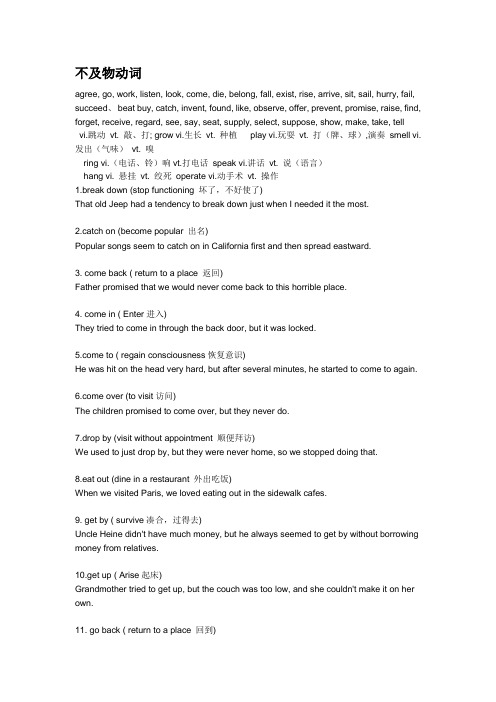
不及物动词agree, go, work, listen, look, come, die, belong, fall, exist, rise, arrive, sit, sail, hurry, fail, succeed、beat buy, catch, invent, found, like, observe, offer, prevent, promise, raise, find, forget, receive, regard, see, say, seat, supply, select, suppose, show, make, take, tell vi.跳动vt. 敲、打; grow vi.生长vt. 种植play vi.玩耍vt. 打(牌、球),演奏smell vi.发出(气味)vt. 嗅ring vi.(电话、铃)响vt.打电话speak vi.讲话vt. 说(语言)hang vi. 悬挂vt. 绞死operate vi.动手术vt. 操作1.break down (stop functioning 坏了,不好使了)That old Jeep had a tendency to break down just when I needed it the most.2.catch on (become popular 出名)Popular songs seem to catch on in California first and then spread eastward.3. come back ( return to a place 返回)Father promised that we would never come back to this horrible place.4. come in ( Enter进入)They tried to come in through the back door, but it was locked.e to ( regain consciousness恢复意识)He was hit on the head very hard, but after several minutes, he started to come to again.e over (to visit访问)The children promised to come over, but they never do.7.drop by (visit without appointment 顺便拜访)We used to just drop by, but they were never home, so we stopped doing that.8.eat out (dine in a restaurant 外出吃饭)When we visited Paris, we loved eating out in the sidewalk cafes.9. get by ( survive凑合,过得去)Uncle Heine didn't have much money, but he always seemed to get by without borrowing money from relatives.10.get up ( Arise起床)Grandmother tried to get up, but the couch was too low, and she couldn't make it on her own.11. go back ( return to a place 回到)It's hard to imagine that we will ever go back to Lithuania.12.go on ( Continue继续)He would finish one Dickens novel and then just go on to the next.13. go on (2) ( Happen发生)The cops heard all the noise and stopped to see what was going on.14. grow up ( get older变老)Charles grew up to be a lot like his father.15.keep away ( remain at a distance保持距离)The judge warned the stalker to keep away from his victim's home.16. keep on (+动名称) ( continue with the same继续保持)He tried to keep on singing long after his voice was ruined.17. pass out ( lose consciousness, faint昏过去,晕)He had drunk too much; he passed out on the sidewalk outside the bar.18. show off ( demonstrate haughtily 炫耀)Whenever he sat down at the piano, we knew he was going to show off.19. show up( Arrive到达,出现)Day after day, Efrain showed up for class twenty minutes late.20. wake up (arouse from sleep醒来)I woke up when the rooster crowed.。
- 1、下载文档前请自行甄别文档内容的完整性,平台不提供额外的编辑、内容补充、找答案等附加服务。
- 2、"仅部分预览"的文档,不可在线预览部分如存在完整性等问题,可反馈申请退款(可完整预览的文档不适用该条件!)。
- 3、如文档侵犯您的权益,请联系客服反馈,我们会尽快为您处理(人工客服工作时间:9:00-18:30)。
一、接不定式(而不接动名词)作宾语的24个常用动词afford to do sth. 负担得起做某事agree to do sth. 同意做某事arrange to do sth.安排做某事ask to do sth. 要求做某事beg to do sth. 请求做某事care to do sth. 想要做某事choose to do sth. 决定做某事decide to do sth. 决定做某事demand to do sth. 要求做某事determine to do sth. 决心做某事expect to do sth. 期待做某事fear to do sth. 害怕做某事help to do sth. 帮助做某事hope to do sth. 希望做某事learn to do sth. 学习做某事manage to do sth. 设法做某事offer to do sth. 主动提出做某事plan to do sth. 计划做某事prepare to do sth. 准备做某事pretend to do sth. 假装做某事promise to do sth. 答应做某事refuse to do sth. 拒绝做某事want to do sth. 想要做某事wish to do sth. 希望做某事注:有些不及物动词后习惯上也接不定式,不接动名词:aim to do sth. 打算做某事fail to do sth. 未能做某事long to do sth. 渴望做某事happen to do sth. 碰巧做某事hesitate to do sth. 犹豫做某事struggle to do sth. 努力做某事跟介词搭配的不及物动词count on 依靠embark on上路gamble on以……打赌insist on坚持……rely on依靠theorize on 对……推理,对……建立理论harp on 老提到……calculate on 指望,依靠concentrate on 集中到……depend on依靠reckon on盼望,指望……account for 说明,解释……answer for回答……apologize for为……道歉suffer for为……受苦pay for 为……付钱look for 寻找atone for补偿,赔偿make up for补偿stand for代表compensate for 补偿abstain from 有意回避,弃权desist from 停止refrain from抑制,忍住shrink from 回避suffer from 受苦,患病benefit from 获益于flinch from 退缩escape from 从……逃开approve of 同意boast of 吹牛consist of 由……组成despair of 失望dream of 梦想做某事repent of 忏悔,懊悔believe in 相信……persevere in 坚持……revel in 陶醉,着迷于……succeed in 在某方面成功delight in 为……高兴join in 加入……participate in 参加……persist in 坚持……specialize in 专门从事某事,在某方面专长aim at 瞄准于……chafe at 恼怒,不满frown at 向……皱眉头scowl at 沉下脸……,对……皱眉laugh at 嘲笑smile at向……微笑work at 从事于……,用功于……look at 看着……attend to 参加……certify to 证明……allude to 暗示……confess to 承认……descend to 下降到……object to 反对……react to 对某事作出反应refer to 提到……resort to 求助,采用……see to 检查……submit to 提交……testify to 表明,说明……turn to 转向……fall to 下跌,减弱及物动词与不及物动词:在英语中按动词后可否直接跟宾语,可以把动词分成两种:及物动词与不及物动词。
及物动词vt.及物动词:又称“他动词”。
又称“外动词”。
动词的一种。
它所表示的动作常涉及动作者以外的事物,如“吃”、“穿”、“读”、“写”等。
字典里词后标有vt. 的就是及物动词。
及物动词后必须跟有动作的对象(即宾语),并且可直接跟宾语。
如see 看见(vt.) +宾语I can see a boy.其实所谓“及物”,就是后面可直接加宾语的动词,有被动形式,而不及物动词是没有被动式的,也不可直接加宾语,需加上介词。
及物动词后面可直接接宾语,不及物动词后面不可直接接宾语,一般要加介词后再接宾语。
实际上很多动词既是及物动词,又是不及物动词。
举一个例子,就说write。
如I am writing.和I am writing a letter.在前一个句子write是不及物动词,在后一个句子write是及物动词。
又如,see是及物动词,但在特殊情况下如seeing is believing。
示例不及物动词就是一个动作不能施加到另一个物体上,也就是后面不能加宾语。
例如:He is running. run这个动词就是不及物动词,后面不能加sth。
(不能说跑什么东西)分清及物不及物动词:分清动词的及物不及物是在英语学习中必须解决的首要问题。
动词及物与不及物通常有以下几种情况:a.主要用作及物动词。
及物动词后面必须跟宾语。
可以用于:"主+谓+宾";"主+谓+双宾";"主+谓+宾+宾补"结构。
如:He reached Paris the day before yesterday.Please hand me the book over there.They asked me to go fishing with them.类似的还有:buy, catch, invent, found, like, observe, offer, prevent, promise, raise, find, forget, receive, regard, see, say, seat, supply, select, suppose, show, make, take, tell....b.主要用作不及物的动词。
不及物动词后面不跟宾语。
只能用于:"主+谓"结构。
This is the room where I once lived.类似的还有:agree, go, work, listen, look, come, die, belong, fall, exist, rise, arrive, sit, sail, hurry, fail, succeed....c.既可以用作及物又可以用作不及物的动词,其意义不变。
如begin 都是作"开始"讲。
everybody , our game begins. let us begin our game. 类似的还有:start, answer, sing, close, consider, insist, read, learn, prepare, pay, hurt, improve....d.既可以用作及物又可以用作不及物的动词,其意义完全不同。
这类动词作不及物动词是一个意义;而作及物动词时却是另一个意义。
如lift作不及物动词时是指烟雾的"消散"。
we saw the mountain when the clouds lifted. 作及物动词时是"升高;举起"。
He lifted his glass and drank.类似的还有:beat vi.跳动vt. 敲、打;grow vi.生长vt.种植play vi.玩耍vt. 打(牌、球),演奏smell vi.发出(气味)vt. 嗅ring vi.(电话、铃)响vt.打电话speak vi.讲话vt. 说(语言)hang vi. 悬挂vt.绞死operate vi.动手术vt. 操作在英语错误中,“及物动词+介词+宾语”(transitive verb+preposition+object),是常见的一种。
所谓及物动词,就是谓语动词(predicative verb),不必通过介词引荐宾语。
相反的,不及物动词(intransitive verb)是不带宾语的。
有许多动词,虽然性质是及物的,但不一定要有宾语,如下列的①a和②a便是这种情形:①a. We study every day.①a. We study every day.b. Do you study English every day.②a. Please write clearly next time.b. Can you write your composition now?如果本质上就是不及物动词,就不会有宾语;若要宾语,就要借介词之助,一起连用才行(不及物动词+宾语+介词),如③b和④b;③a和④a是错的;*③a. The children are listening the music.b. The children are listening to the music.*④a. She is laughing the crippled man.b. She is laughing at the crippled man.反之,及物动词不必靠介词,就可以带宾语,如上述的①b和②b ,又如⑤和⑥:⑤John is giving a book to me.⑥Who will answer this question?如果无意中把介词加上,就错了,如:*⑦Who will answer to this question?下列这句从房地产广告中看到的句子,也犯了同样的错:“We have many buyers awaiting for available units here.”“Awaiting”是个及物动词,后面的介词“for”是多余的,要去掉;不然把“awaiting”改为“waiting for”也行。
许多人习惯上喜欢把介词加到及物动词后面,然后才带出宾语。
最常见的是“emphasize/stress on/upon”和“discuss about”,如:⑧Singaporeans seem to have emphasized on material gains.⑨In our education system, we stress upon examination results.⑩World leaders spent a lot of time discussing about worsening economic problems.显然的,这三句里的介词“on/upon”和“about”是多余的,不必要的。
